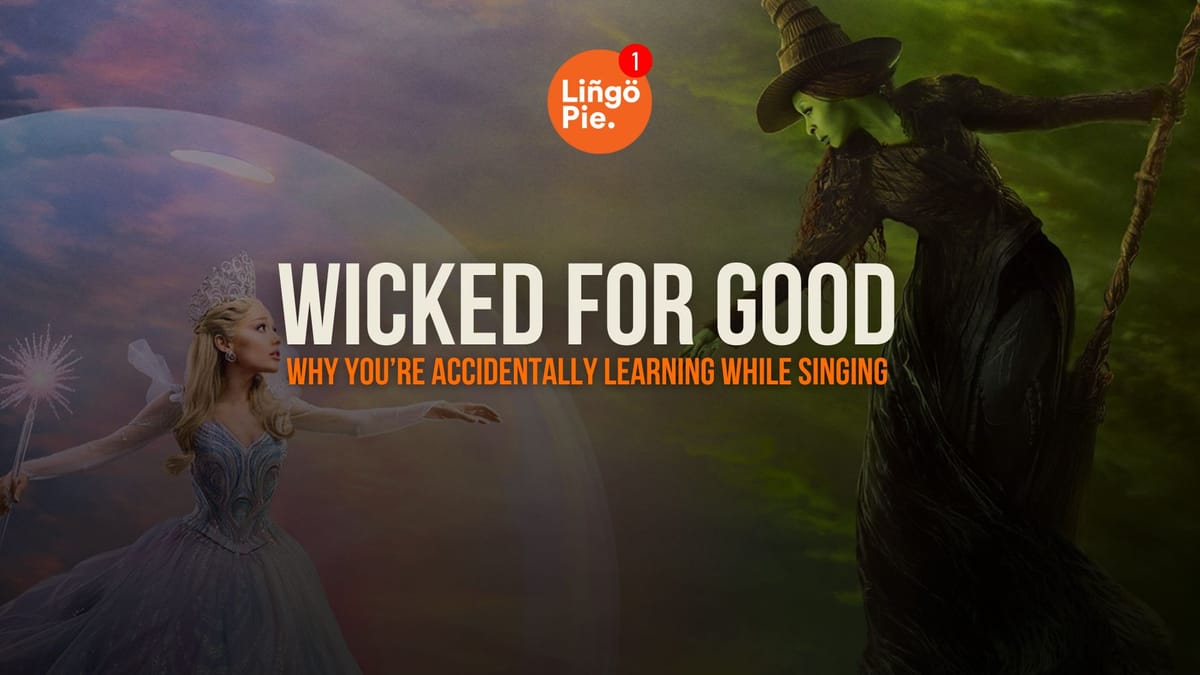Wicked: For Good just dropped, and if you’ve seen it, you already know "Defying Gravity" has been living in your head rent-free. What if you were singing it in Spanish though? Or Korean? Or literally any language you’ve been thinking about learning? Your brain would be absorbing those words the exact same way, except now you'd actually be learning something.
I mean, you've probably memorized entire songs without trying, right? Maybe it was an English song when you were a kid, or maybe you randomly know all the words to that one Bad Bunny track even though you don’t speak Spanish. You weren’t studying. The words just stuck because that’s what music does to your brain.
So if this is already happening anyway, why not point it at a language you want to learn?
- 5 Best Language Immersion Programs For Adults [Guide]
- How Dual Subtitles Accelerate Language Learning (And Where to Find Them)
- What Is An Agglutinative Language? (And Why They’re Actually Easier Than You Think)

What Is Lyrics Training Anyway?
Lyrics training is a way to learn a language through songs. You pick a track in your target language and follow the lyrics to pick up pronunciation, vocabulary, slang, and natural expressions. Music also helps lower language anxiety, which makes it easier to absorb meaning and remember phrases.
For example, when a Spanish song says “estoy en las nubes,” you learn it means “daydreaming,” not a literal, word-for-word translation.
There are two main ways you can use it:
- Follow along passively: listen and read the lyrics to get used to the rhythm, sound, and natural phrasing.
- Turn it into practice: use fill-in-the-blank or quiz-style exercises. AI tools can generate these from any song, giving you quick, targeted practice.
Why Songs Get Stuck in Your Head (And Why That’s Amazing for Language Learning)
Ever wonder why you can remember every word to a song you heard once, but forget the vocabulary list you studied yesterday? The truth is that your brain treats music differently from regular information.
Your Brain Links Music and Words Together
When you hear a song, your brain does not store the melody and lyrics separately. They get packaged together as one memory. That is why when you hear the first note of a song, the words automatically come flooding back. It’s almost instinctive, the same way John Wick reacts without stopping to think—your brain just fires off the next move.
For language learning, this is huge because you are essentially getting two for one. The melody acts like a memory anchor that pulls up all the words attached to it. So when that chorus loops in your head for the hundredth time, you are reinforcing vocabulary without opening a single textbook.
You Actually Want to Repeat Songs
When you are studying dialogue or reading a text, repetition feels like a chore. You have to force yourself to go over it again. With songs though? You want to replay them. You are hitting repeat voluntarily. You are singing along in the shower, humming it while you work, playing it on loop during your commute.
That repetition is exactly what language learning needs, except now it does not feel like studying. Your brain is getting hundreds of repetitions without the burnout that comes from drilling flashcards.

You Can Learn During Downtime
You cannot pull out flashcards while driving or flip through a textbook at the gym. But you can absolutely have music playing. Songs let you practice language during all those in-between moments when your hands or eyes are busy, but your ears are free.
The best part? Repetition happens naturally. The first time you hear a song, you might catch a few words. By the third or fourth listen, you are noticing phrases you missed before. By the tenth time, you are singing along without realizing you memorized an entire verse. That is hours of language exposure happening in time you would have wasted anyway.
How to Actually Do This with Lingopie Music
Okay, so you get why songs work. Now here is how to make it happen. Lingopie Music lets you watch music videos with dual-language subtitles. You see the lyrics in your target language and your native language at the same time. No more pausing every five seconds to look up what a word means. You are reading along, hearing how it is pronounced, and understanding what it actually means, all in one go.
Follow Along Passively

Start by just listening and reading the lyrics as the song plays. You are getting used to the rhythm, the sound, and how native speakers actually phrase things. The dual subtitles let you connect what you are hearing to what it means without breaking your flow. Click on any word you do not know and get an instant definition right there.
Turn It Into Active Practice

With Lingopie Music, every word you click on gets saved as a flashcard automatically. So while you are vibing to songs and looking up lyrics, you are building your own personalized vocabulary deck without even trying. Later, you can review those flashcards in study sessions or turn them into quizzes. The more songs you watch, the bigger your collection gets.
Use AI to Create Your Own Lyrics Training Exercises
If you want to take lyrics training further, AI can turn any song into a custom learning tool. You can use tools like ChatGPT or Claude to generate fill in the blank exercises from lyrics. Just paste the lyrics and ask the AI to create a quiz. You get instant practice material tailored to whatever song you are obsessed with right now.
Tip: This strategy is especially useful for songs that are not on streaming platforms or if you want to focus on specific sections that are tricky for you.
Sample Prompt You Can Use
Copy and paste this into any AI tool:
"I'm learning [target language]. Can you create a fill-in-the-blank lyrics training exercise using these song lyrics? Remove 10-15 key words and replace them with blanks. Include an answer key at the end. Here are the lyrics:
[paste lyrics here]"
The AI will generate a worksheet you can practice with. You can make it harder by asking for more blanks or easier by specifying you only want verbs or nouns removed. Play around with it until you find what works for your level. Save the exercises and come back to them after a few days to test if the words actually stuck.
So, What Are You Waiting For?
The next time you replay a Wicked song for the hundredth time, imagine doing that in the language you want to learn. You would be training your ear, building vocabulary, and getting closer to fluency without it feeling like work.
For the next step, I encourage you to pick one song in your target language on Lingopie Music (included with your Lingopie subscription for selected languages). Use the dual subtitles. Click on words you do not know. Let the song loop until it gets stuck in your head. You will be singing in another language without realizing you learned it.
Want to try it? Sign up for a FREE 7-day trial below!




![Noun Gender In Spanish: Masculine And Feminine Nouns [Guide]](/blog/content/images/2025/11/Noun-Gender-In-Spanish.jpeg)


![19 Best Spanish Series For Learning Spanish Fast [2026]](/blog/content/images/size/w300/2025/04/best-shows-to-watch-to-learn-spanish.jpg)

